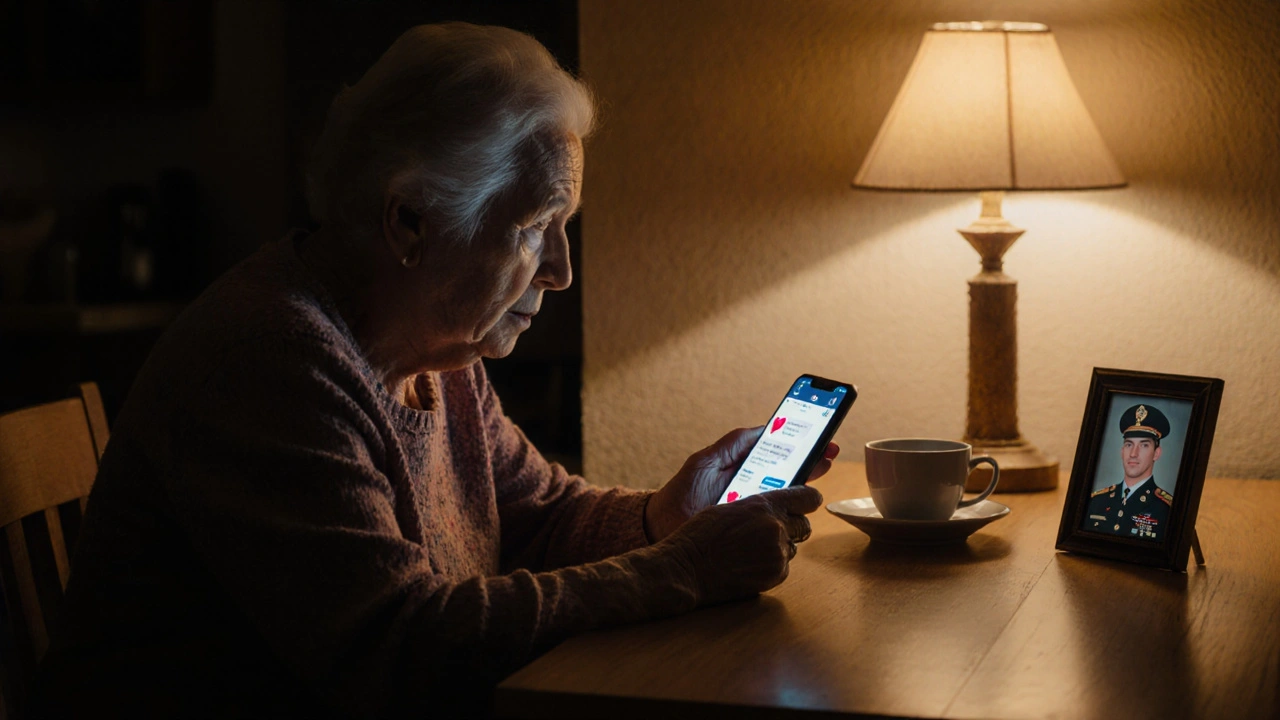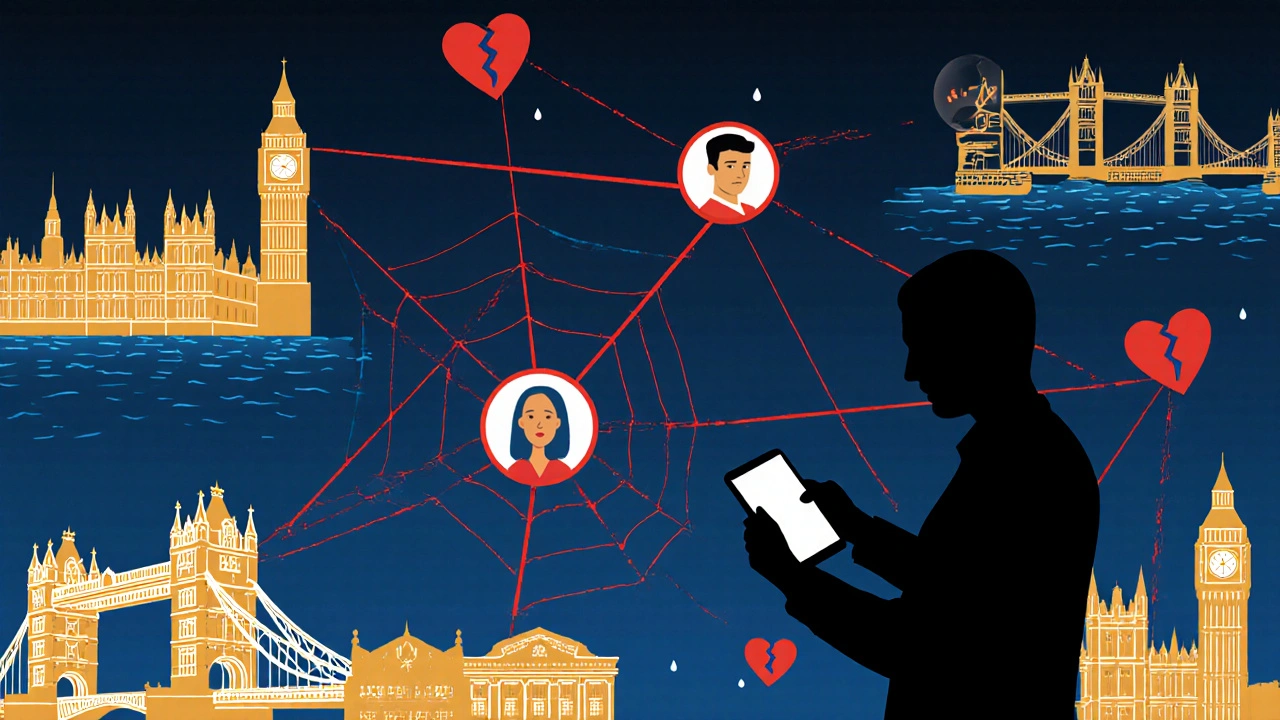
Every year in London, hundreds of people lose thousands of pounds-not to pickpockets or phishing emails, but to someone they thought loved them. These aren’t Hollywood plots. They’re real lives shattered by romance fraud. A kind message at 11 p.m. turns into a plea for help paying for a sick relative. A sweet voice on video call becomes a demand for cash to fix a broken plane ticket. By the time you realize it’s fake, the money’s gone, and the person? Vanished.
London has over 4 million adults using dating apps. That’s one in four people. And according to Action Fraud, romance scams in the UK jumped 35% between 2023 and 2024. The average loss? £16,000. Most victims are over 45. Many are widowed, divorced, or lonely after years of focusing on work or family. They’re not foolish. They’re human.
How Romance Fraud Works in London
Scammers don’t break in. They build in. They spend weeks, sometimes months, gaining trust. They’ll ask about your childhood, your dog, your favorite coffee shop. They’ll send you photos-often stolen from models or soldiers online. They’ll video call using pre-recorded clips or fake profiles. They’ll say they’re in London but stuck abroad for work. Military personnel, oil rig workers, and aid volunteers are common fake identities. Why? Because they sound credible, and their absence explains why you never meet.
In 2024, a retired teacher from Croydon sent £28,000 to someone she met on Bumble. He claimed he was a British Army engineer stationed in Cyprus. He sent her photos of himself in uniform. He called every night. He told her he’d proposed to her in his heart. Then came the emergency: his pay was frozen. He needed £5,000 to fly home. She gave it. Then another. Then another. When she asked to meet, he said his visa was delayed. She never saw him again.
The scam doesn’t start with money. It starts with connection. That’s why it’s so hard to spot.
Red Flags You Can’t Ignore
Here are the signs that someone might be lying:
- They avoid video calls-or always have an excuse: bad internet, camera broken, too busy.
- They move fast-"I’ve never felt this way before," "I knew you were the one from day one." Real love takes time.
- They ask for money early-even small amounts. "Can you cover my Uber to the airport?" "My dog needs emergency surgery."
- They refuse to meet in person-especially in London. "I’m here next week," they say. Then it’s postponed. Again. And again.
- Their story changes-one day they’re from Manchester, the next they’re from Dubai. Their job shifts from engineer to consultant to freelance photographer.
- They use emotional pressure-"If you really loved me, you’d help me." "I’m so grateful you’re the only one who understands me."
If any of these show up in the first two weeks, walk away. Don’t argue. Don’t explain. Just stop replying.

How to Protect Yourself in London
There’s no app that blocks every scammer. But you can build your own safety net.
- Use only verified apps-Stick to well-known platforms like Tinder, Bumble, Hinge, or Match. Avoid lesser-known apps with no user reviews or poor security.
- Reverse image search-Take any photo they send and drag it into Google Images. If it shows up on a stock photo site, a modeling portfolio, or a soldier’s LinkedIn, it’s fake.
- Ask for a live video call-Not a pre-recorded clip. A real-time call. If they say no, that’s your answer.
- Never send money-Not for flights, medical bills, business deals, or "emergency" repairs. Even £50 is a red flag. Real people don’t ask strangers for cash.
- Meet in public, early, and with a friend-If you decide to meet, choose a busy café in central London. Tell a friend where you’re going. Keep your phone charged. Leave when you want to.
- Check their social media-Look at their Facebook, Instagram, or LinkedIn. Do they have real friends? Real posts? Or just a few photos and zero activity? Fake profiles are often empty or copied.
London has free safety workshops run by the Metropolitan Police and charities like Action Fraud. You can book one at your local library or community center. They’re not scary. They’re practical. And they’ve helped thousands avoid disaster.
What to Do If You’ve Been Scammed
If you’ve already sent money, don’t blame yourself. Scammers are experts at manipulation. Your job now is to stop the bleeding and get help.
- Stop all contact-Block them everywhere. Don’t reply to any messages, even if they beg or threaten.
- Report it-Go to actionfraud.police.uk or call 0300 123 2040. Even if you think it’s too late, reporting helps police track patterns and warn others.
- Contact your bank-Tell them immediately. If you paid by bank transfer, they might be able to stop it. If you used a credit card, you may be eligible for a chargeback.
- Reach out for support-Talk to someone. Friends, family, or a counselor. Many victims feel ashamed. But you’re not alone. Organizations like the National Cyber Security Centre and the London Survivors Network offer free, confidential help.
One woman from Islington lost £42,000. She didn’t tell anyone for six months. When she finally did, her daughter helped her report it. That report led police to a ring of scammers targeting 37 people across the UK. Her pain saved others.

Why This Keeps Happening
Scammers don’t target London because it’s rich. They target it because it’s full of people who are kind, patient, and hoping for connection. Loneliness is the real enemy here-not technology.
After divorce, after loss, after years of working long hours, many Londoners feel invisible. Scammers exploit that. They offer attention. They offer love. They offer the illusion of being seen.
That’s why prevention isn’t just about apps and passwords. It’s about community. It’s about checking in on neighbors. It’s about inviting someone for tea. It’s about reminding people they’re not alone.
If you know someone who’s dating online, ask them how it’s going. Don’t judge. Just listen. Sometimes, that’s the safest thing you can do.
Final Thought: Love Doesn’t Ask for Money
Real love doesn’t need to be proven with cash. It doesn’t vanish when you say no. It doesn’t disappear after you ask to meet. It doesn’t ask you to lie to your family or hide the truth.
If someone makes you feel like you’re the only one who understands them-be careful. That’s not romance. That’s manipulation.
You deserve connection. You deserve kindness. But you don’t have to risk your safety to find it.
How common are romance scams in London?
Romance scams are rising fast. In 2024, Action Fraud recorded over 1,200 reports from London alone. The average loss was £16,000. Most victims are over 45, and many are widowed or divorced. These aren’t rare cases-they’re a growing crisis.
Can I trust someone I met on a dating app if they video call?
Not necessarily. Scammers use deepfake videos, pre-recorded clips, and even hire actors to fake live calls. Ask them to do something spontaneous-like hold up today’s newspaper or describe what’s outside their window. If they hesitate or give vague answers, be suspicious.
What if they say they’re from the UK but working abroad?
Many scammers claim to be British military, oil workers, or aid volunteers overseas. Check their story. Ask for their unit number, base location, or employer. Then search online. Real UK military personnel don’t ask strangers for money. If they can’t provide details or their story doesn’t match public records, it’s fake.
Should I report a scam even if I only lost a small amount?
Yes. Even £50 matters. Reporting helps police track patterns and identify scam networks. Many big cases start with small reports. Your report could stop someone else from losing thousands.
Are there free support services in London for victims?
Yes. Action Fraud offers free advice and reporting. The Metropolitan Police have victim support teams. Charities like Victim Support and the London Survivors Network provide counseling and emotional help-all free and confidential. You don’t have to go through this alone.